Analysis of UK Business Law: Sources, Compliance, and Problem Solving
VerifiedAdded on 2024/06/10
|23
|5401
|379
Report
AI Summary
This report provides a comprehensive overview of the UK's business law, exploring various legal sources and their impact on organizational compliance. It explains the roles of government in lawmaking, the application of statutory and common law, and evaluates the effectiveness of the legal system through recent reforms. The report uses specific examples to illustrate the impact of company, employment, and contract law on businesses, differentiating the potential impacts of regulations, legislation, and standards. Furthermore, it suggests appropriate legal solutions for a range of business problems, such as contract termination and insolvency, justifying the use of these solutions and recommending alternative approaches, including considering legal systems in other countries. The report also assesses the positive and negative impacts of legal solutions, comparing the effectiveness of different recommendations and alternative dispute resolution methods.
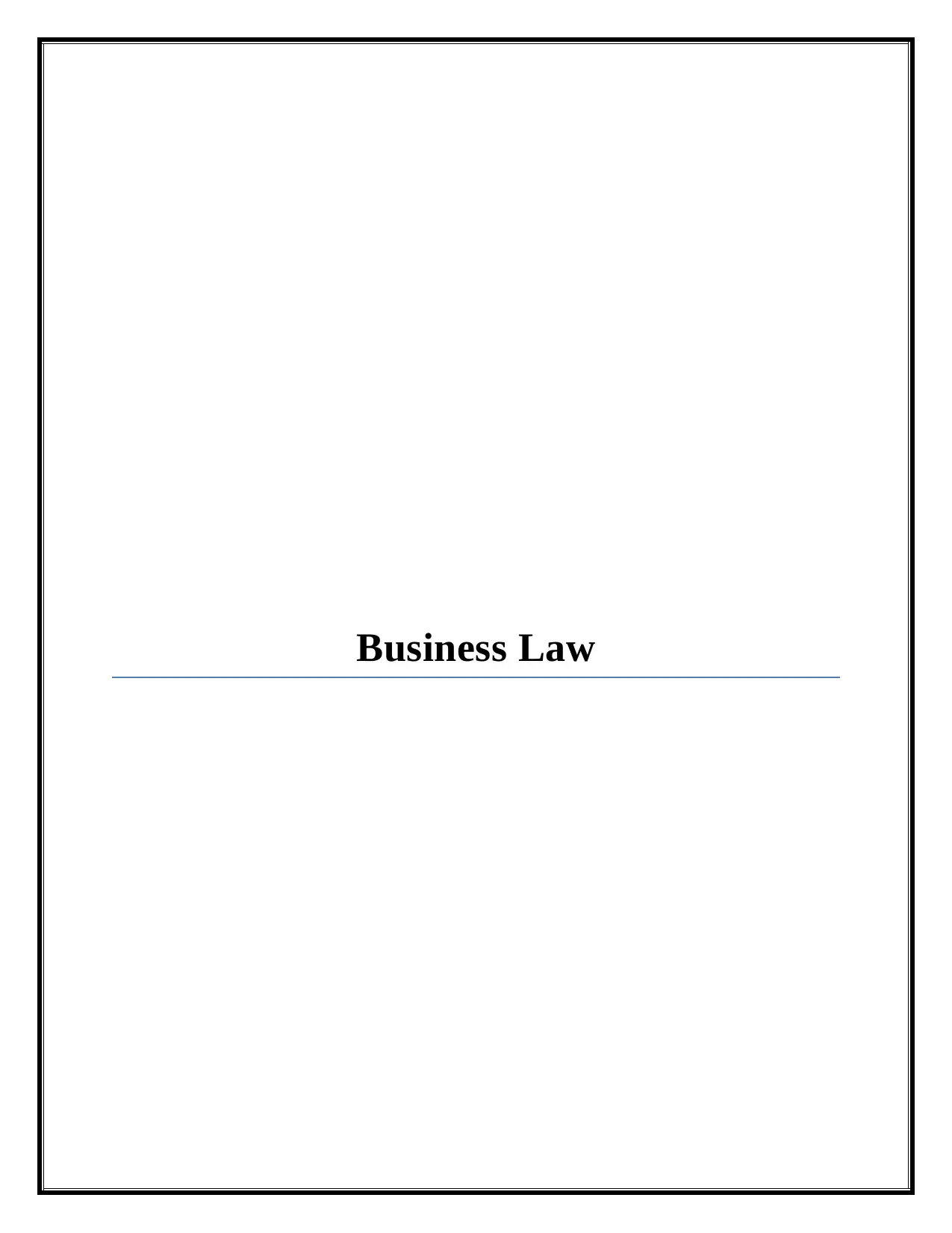
Business Law
Paraphrase This Document
Need a fresh take? Get an instant paraphrase of this document with our AI Paraphraser
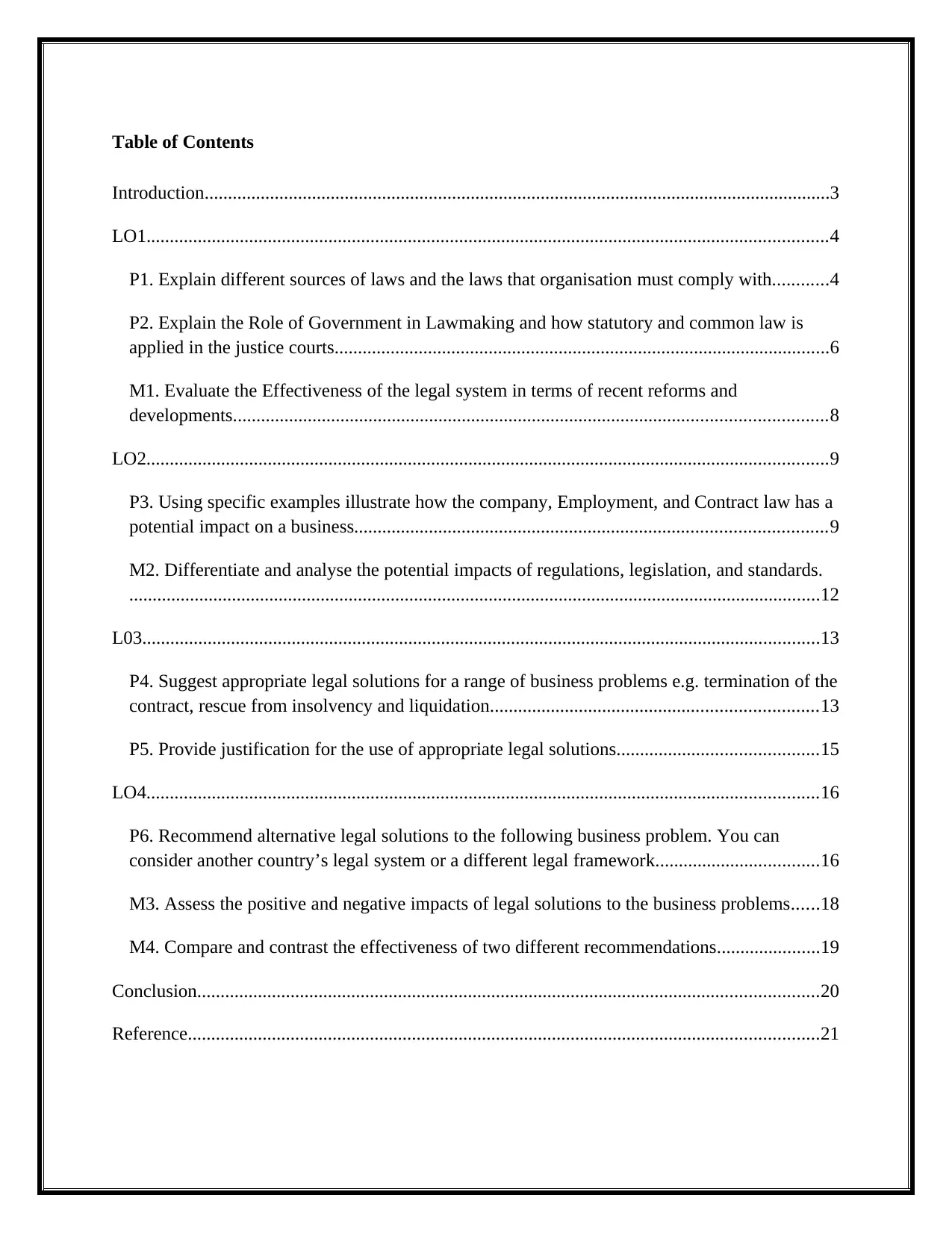
Table of Contents
Introduction......................................................................................................................................3
LO1..................................................................................................................................................4
P1. Explain different sources of laws and the laws that organisation must comply with............4
P2. Explain the Role of Government in Lawmaking and how statutory and common law is
applied in the justice courts..........................................................................................................6
M1. Evaluate the Effectiveness of the legal system in terms of recent reforms and
developments...............................................................................................................................8
LO2..................................................................................................................................................9
P3. Using specific examples illustrate how the company, Employment, and Contract law has a
potential impact on a business.....................................................................................................9
M2. Differentiate and analyse the potential impacts of regulations, legislation, and standards.
....................................................................................................................................................12
L03.................................................................................................................................................13
P4. Suggest appropriate legal solutions for a range of business problems e.g. termination of the
contract, rescue from insolvency and liquidation......................................................................13
P5. Provide justification for the use of appropriate legal solutions...........................................15
LO4................................................................................................................................................16
P6. Recommend alternative legal solutions to the following business problem. You can
consider another country’s legal system or a different legal framework...................................16
M3. Assess the positive and negative impacts of legal solutions to the business problems......18
M4. Compare and contrast the effectiveness of two different recommendations......................19
Conclusion.....................................................................................................................................20
Reference.......................................................................................................................................21
Introduction......................................................................................................................................3
LO1..................................................................................................................................................4
P1. Explain different sources of laws and the laws that organisation must comply with............4
P2. Explain the Role of Government in Lawmaking and how statutory and common law is
applied in the justice courts..........................................................................................................6
M1. Evaluate the Effectiveness of the legal system in terms of recent reforms and
developments...............................................................................................................................8
LO2..................................................................................................................................................9
P3. Using specific examples illustrate how the company, Employment, and Contract law has a
potential impact on a business.....................................................................................................9
M2. Differentiate and analyse the potential impacts of regulations, legislation, and standards.
....................................................................................................................................................12
L03.................................................................................................................................................13
P4. Suggest appropriate legal solutions for a range of business problems e.g. termination of the
contract, rescue from insolvency and liquidation......................................................................13
P5. Provide justification for the use of appropriate legal solutions...........................................15
LO4................................................................................................................................................16
P6. Recommend alternative legal solutions to the following business problem. You can
consider another country’s legal system or a different legal framework...................................16
M3. Assess the positive and negative impacts of legal solutions to the business problems......18
M4. Compare and contrast the effectiveness of two different recommendations......................19
Conclusion.....................................................................................................................................20
Reference.......................................................................................................................................21

⊘ This is a preview!⊘
Do you want full access?
Subscribe today to unlock all pages.

Trusted by 1+ million students worldwide
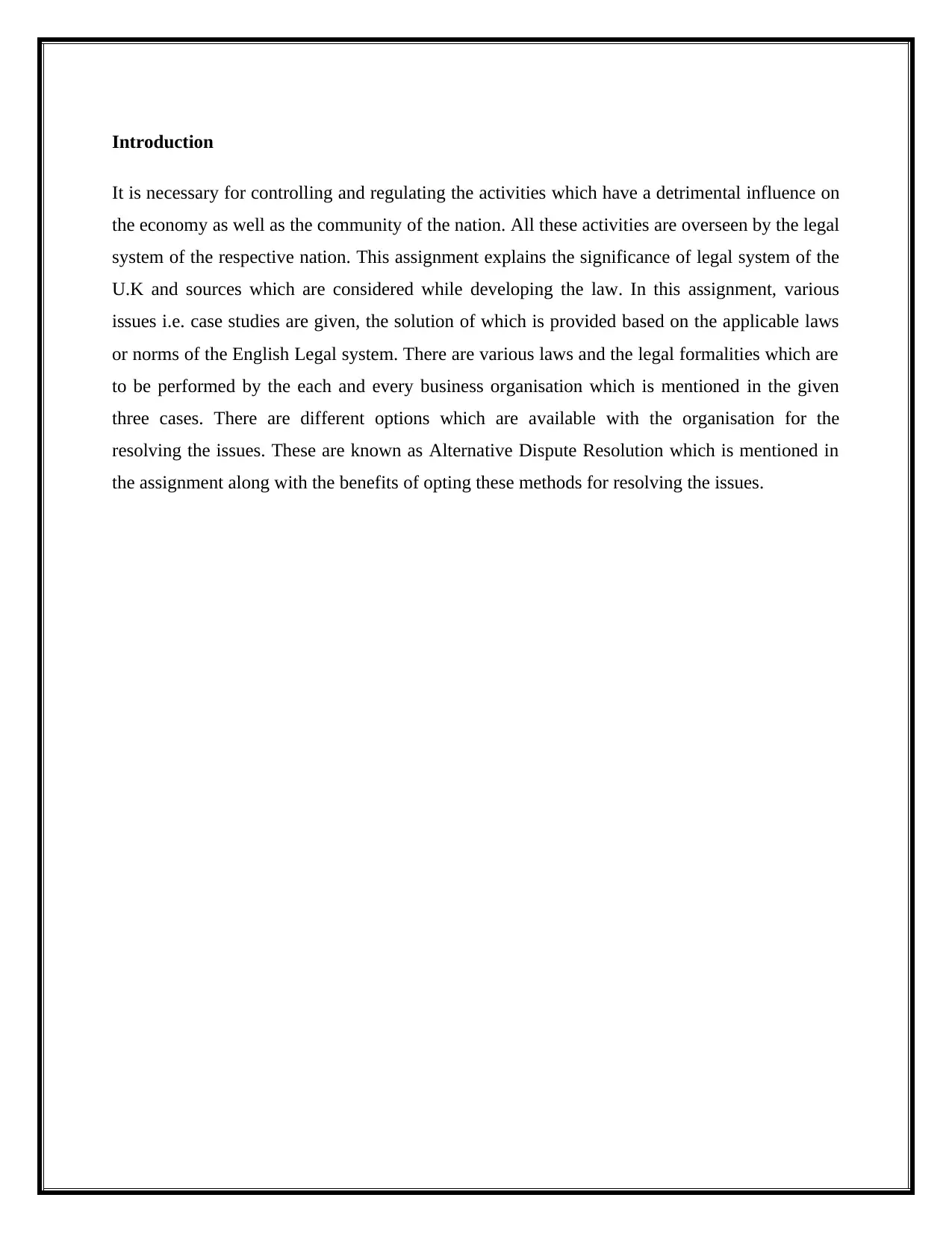
Introduction
It is necessary for controlling and regulating the activities which have a detrimental influence on
the economy as well as the community of the nation. All these activities are overseen by the legal
system of the respective nation. This assignment explains the significance of legal system of the
U.K and sources which are considered while developing the law. In this assignment, various
issues i.e. case studies are given, the solution of which is provided based on the applicable laws
or norms of the English Legal system. There are various laws and the legal formalities which are
to be performed by the each and every business organisation which is mentioned in the given
three cases. There are different options which are available with the organisation for the
resolving the issues. These are known as Alternative Dispute Resolution which is mentioned in
the assignment along with the benefits of opting these methods for resolving the issues.
It is necessary for controlling and regulating the activities which have a detrimental influence on
the economy as well as the community of the nation. All these activities are overseen by the legal
system of the respective nation. This assignment explains the significance of legal system of the
U.K and sources which are considered while developing the law. In this assignment, various
issues i.e. case studies are given, the solution of which is provided based on the applicable laws
or norms of the English Legal system. There are various laws and the legal formalities which are
to be performed by the each and every business organisation which is mentioned in the given
three cases. There are different options which are available with the organisation for the
resolving the issues. These are known as Alternative Dispute Resolution which is mentioned in
the assignment along with the benefits of opting these methods for resolving the issues.
Paraphrase This Document
Need a fresh take? Get an instant paraphrase of this document with our AI Paraphraser
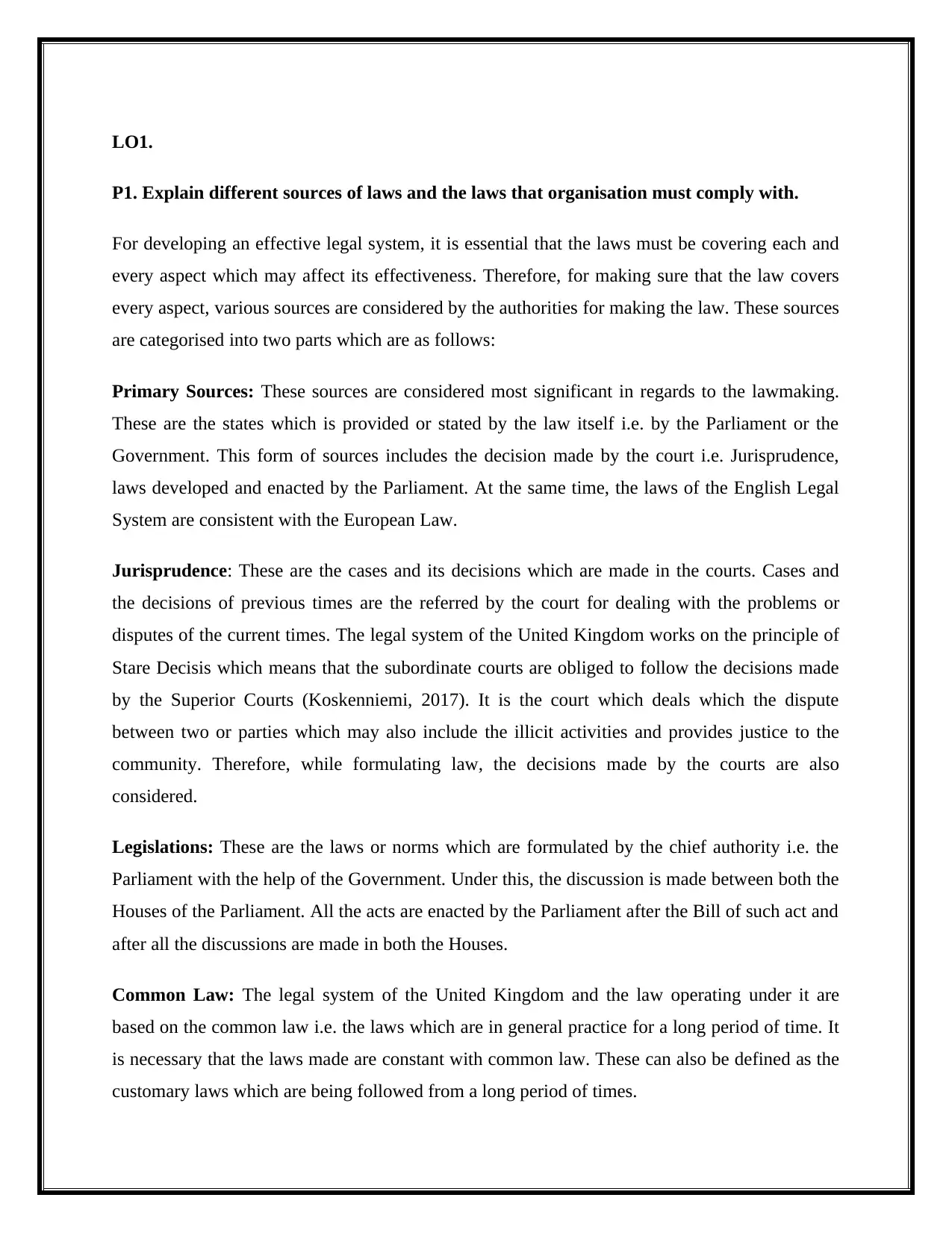
LO1.
P1. Explain different sources of laws and the laws that organisation must comply with.
For developing an effective legal system, it is essential that the laws must be covering each and
every aspect which may affect its effectiveness. Therefore, for making sure that the law covers
every aspect, various sources are considered by the authorities for making the law. These sources
are categorised into two parts which are as follows:
Primary Sources: These sources are considered most significant in regards to the lawmaking.
These are the states which is provided or stated by the law itself i.e. by the Parliament or the
Government. This form of sources includes the decision made by the court i.e. Jurisprudence,
laws developed and enacted by the Parliament. At the same time, the laws of the English Legal
System are consistent with the European Law.
Jurisprudence: These are the cases and its decisions which are made in the courts. Cases and
the decisions of previous times are the referred by the court for dealing with the problems or
disputes of the current times. The legal system of the United Kingdom works on the principle of
Stare Decisis which means that the subordinate courts are obliged to follow the decisions made
by the Superior Courts (Koskenniemi, 2017). It is the court which deals which the dispute
between two or parties which may also include the illicit activities and provides justice to the
community. Therefore, while formulating law, the decisions made by the courts are also
considered.
Legislations: These are the laws or norms which are formulated by the chief authority i.e. the
Parliament with the help of the Government. Under this, the discussion is made between both the
Houses of the Parliament. All the acts are enacted by the Parliament after the Bill of such act and
after all the discussions are made in both the Houses.
Common Law: The legal system of the United Kingdom and the law operating under it are
based on the common law i.e. the laws which are in general practice for a long period of time. It
is necessary that the laws made are constant with common law. These can also be defined as the
customary laws which are being followed from a long period of times.
P1. Explain different sources of laws and the laws that organisation must comply with.
For developing an effective legal system, it is essential that the laws must be covering each and
every aspect which may affect its effectiveness. Therefore, for making sure that the law covers
every aspect, various sources are considered by the authorities for making the law. These sources
are categorised into two parts which are as follows:
Primary Sources: These sources are considered most significant in regards to the lawmaking.
These are the states which is provided or stated by the law itself i.e. by the Parliament or the
Government. This form of sources includes the decision made by the court i.e. Jurisprudence,
laws developed and enacted by the Parliament. At the same time, the laws of the English Legal
System are consistent with the European Law.
Jurisprudence: These are the cases and its decisions which are made in the courts. Cases and
the decisions of previous times are the referred by the court for dealing with the problems or
disputes of the current times. The legal system of the United Kingdom works on the principle of
Stare Decisis which means that the subordinate courts are obliged to follow the decisions made
by the Superior Courts (Koskenniemi, 2017). It is the court which deals which the dispute
between two or parties which may also include the illicit activities and provides justice to the
community. Therefore, while formulating law, the decisions made by the courts are also
considered.
Legislations: These are the laws or norms which are formulated by the chief authority i.e. the
Parliament with the help of the Government. Under this, the discussion is made between both the
Houses of the Parliament. All the acts are enacted by the Parliament after the Bill of such act and
after all the discussions are made in both the Houses.
Common Law: The legal system of the United Kingdom and the law operating under it are
based on the common law i.e. the laws which are in general practice for a long period of time. It
is necessary that the laws made are constant with common law. These can also be defined as the
customary laws which are being followed from a long period of times.
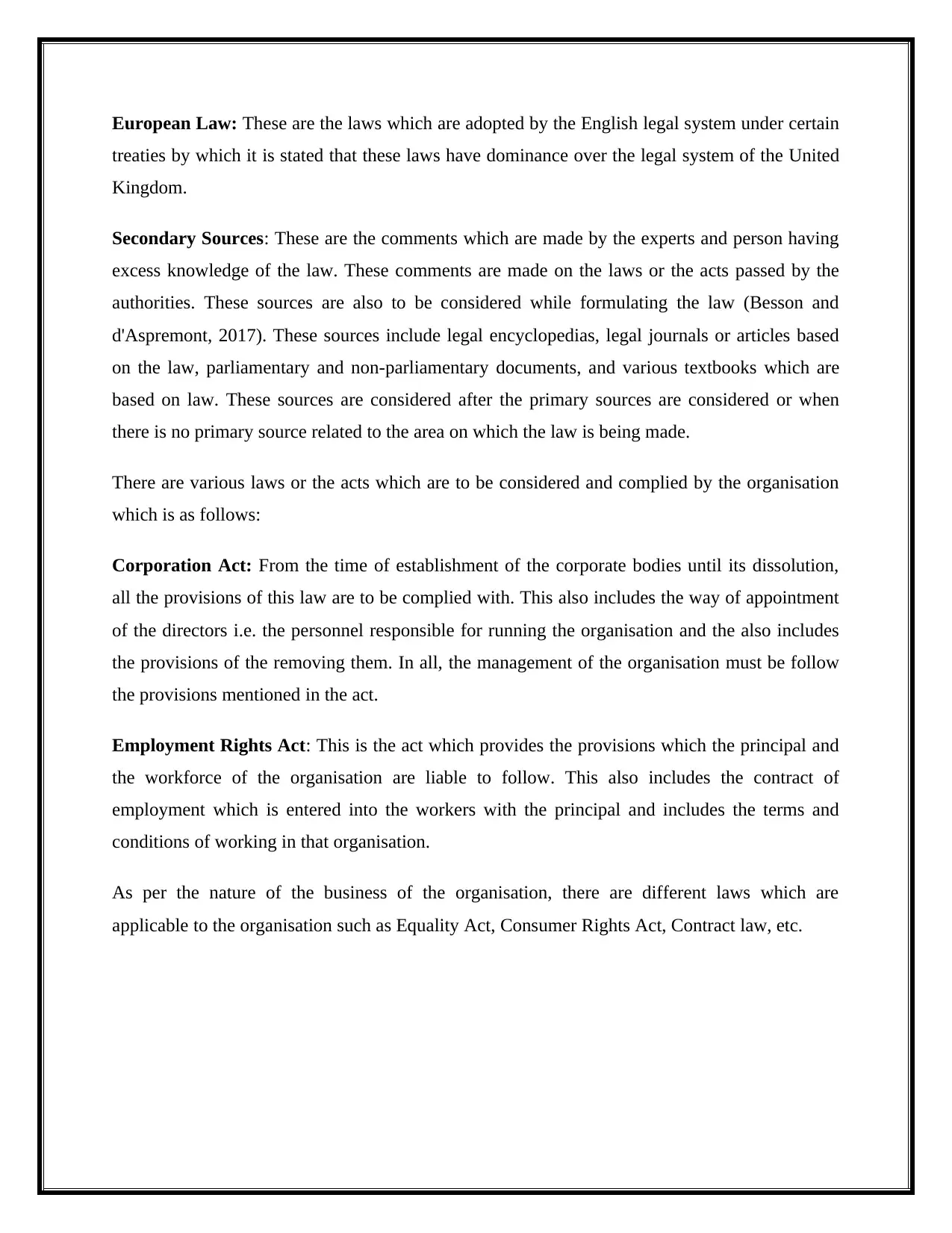
European Law: These are the laws which are adopted by the English legal system under certain
treaties by which it is stated that these laws have dominance over the legal system of the United
Kingdom.
Secondary Sources: These are the comments which are made by the experts and person having
excess knowledge of the law. These comments are made on the laws or the acts passed by the
authorities. These sources are also to be considered while formulating the law (Besson and
d'Aspremont, 2017). These sources include legal encyclopedias, legal journals or articles based
on the law, parliamentary and non-parliamentary documents, and various textbooks which are
based on law. These sources are considered after the primary sources are considered or when
there is no primary source related to the area on which the law is being made.
There are various laws or the acts which are to be considered and complied by the organisation
which is as follows:
Corporation Act: From the time of establishment of the corporate bodies until its dissolution,
all the provisions of this law are to be complied with. This also includes the way of appointment
of the directors i.e. the personnel responsible for running the organisation and the also includes
the provisions of the removing them. In all, the management of the organisation must be follow
the provisions mentioned in the act.
Employment Rights Act: This is the act which provides the provisions which the principal and
the workforce of the organisation are liable to follow. This also includes the contract of
employment which is entered into the workers with the principal and includes the terms and
conditions of working in that organisation.
As per the nature of the business of the organisation, there are different laws which are
applicable to the organisation such as Equality Act, Consumer Rights Act, Contract law, etc.
treaties by which it is stated that these laws have dominance over the legal system of the United
Kingdom.
Secondary Sources: These are the comments which are made by the experts and person having
excess knowledge of the law. These comments are made on the laws or the acts passed by the
authorities. These sources are also to be considered while formulating the law (Besson and
d'Aspremont, 2017). These sources include legal encyclopedias, legal journals or articles based
on the law, parliamentary and non-parliamentary documents, and various textbooks which are
based on law. These sources are considered after the primary sources are considered or when
there is no primary source related to the area on which the law is being made.
There are various laws or the acts which are to be considered and complied by the organisation
which is as follows:
Corporation Act: From the time of establishment of the corporate bodies until its dissolution,
all the provisions of this law are to be complied with. This also includes the way of appointment
of the directors i.e. the personnel responsible for running the organisation and the also includes
the provisions of the removing them. In all, the management of the organisation must be follow
the provisions mentioned in the act.
Employment Rights Act: This is the act which provides the provisions which the principal and
the workforce of the organisation are liable to follow. This also includes the contract of
employment which is entered into the workers with the principal and includes the terms and
conditions of working in that organisation.
As per the nature of the business of the organisation, there are different laws which are
applicable to the organisation such as Equality Act, Consumer Rights Act, Contract law, etc.
⊘ This is a preview!⊘
Do you want full access?
Subscribe today to unlock all pages.

Trusted by 1+ million students worldwide
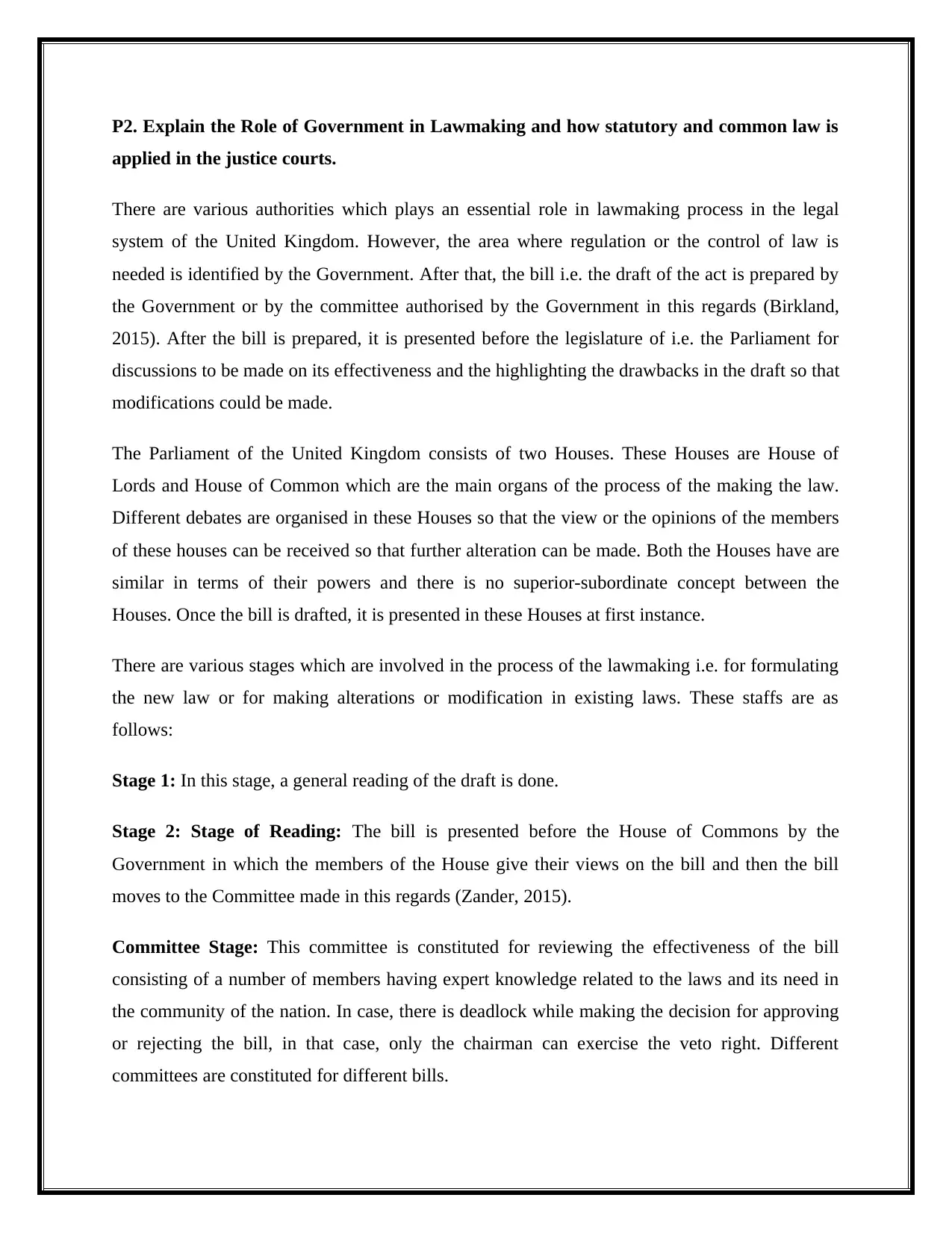
P2. Explain the Role of Government in Lawmaking and how statutory and common law is
applied in the justice courts.
There are various authorities which plays an essential role in lawmaking process in the legal
system of the United Kingdom. However, the area where regulation or the control of law is
needed is identified by the Government. After that, the bill i.e. the draft of the act is prepared by
the Government or by the committee authorised by the Government in this regards (Birkland,
2015). After the bill is prepared, it is presented before the legislature of i.e. the Parliament for
discussions to be made on its effectiveness and the highlighting the drawbacks in the draft so that
modifications could be made.
The Parliament of the United Kingdom consists of two Houses. These Houses are House of
Lords and House of Common which are the main organs of the process of the making the law.
Different debates are organised in these Houses so that the view or the opinions of the members
of these houses can be received so that further alteration can be made. Both the Houses have are
similar in terms of their powers and there is no superior-subordinate concept between the
Houses. Once the bill is drafted, it is presented in these Houses at first instance.
There are various stages which are involved in the process of the lawmaking i.e. for formulating
the new law or for making alterations or modification in existing laws. These staffs are as
follows:
Stage 1: In this stage, a general reading of the draft is done.
Stage 2: Stage of Reading: The bill is presented before the House of Commons by the
Government in which the members of the House give their views on the bill and then the bill
moves to the Committee made in this regards (Zander, 2015).
Committee Stage: This committee is constituted for reviewing the effectiveness of the bill
consisting of a number of members having expert knowledge related to the laws and its need in
the community of the nation. In case, there is deadlock while making the decision for approving
or rejecting the bill, in that case, only the chairman can exercise the veto right. Different
committees are constituted for different bills.
applied in the justice courts.
There are various authorities which plays an essential role in lawmaking process in the legal
system of the United Kingdom. However, the area where regulation or the control of law is
needed is identified by the Government. After that, the bill i.e. the draft of the act is prepared by
the Government or by the committee authorised by the Government in this regards (Birkland,
2015). After the bill is prepared, it is presented before the legislature of i.e. the Parliament for
discussions to be made on its effectiveness and the highlighting the drawbacks in the draft so that
modifications could be made.
The Parliament of the United Kingdom consists of two Houses. These Houses are House of
Lords and House of Common which are the main organs of the process of the making the law.
Different debates are organised in these Houses so that the view or the opinions of the members
of these houses can be received so that further alteration can be made. Both the Houses have are
similar in terms of their powers and there is no superior-subordinate concept between the
Houses. Once the bill is drafted, it is presented in these Houses at first instance.
There are various stages which are involved in the process of the lawmaking i.e. for formulating
the new law or for making alterations or modification in existing laws. These staffs are as
follows:
Stage 1: In this stage, a general reading of the draft is done.
Stage 2: Stage of Reading: The bill is presented before the House of Commons by the
Government in which the members of the House give their views on the bill and then the bill
moves to the Committee made in this regards (Zander, 2015).
Committee Stage: This committee is constituted for reviewing the effectiveness of the bill
consisting of a number of members having expert knowledge related to the laws and its need in
the community of the nation. In case, there is deadlock while making the decision for approving
or rejecting the bill, in that case, only the chairman can exercise the veto right. Different
committees are constituted for different bills.
Paraphrase This Document
Need a fresh take? Get an instant paraphrase of this document with our AI Paraphraser
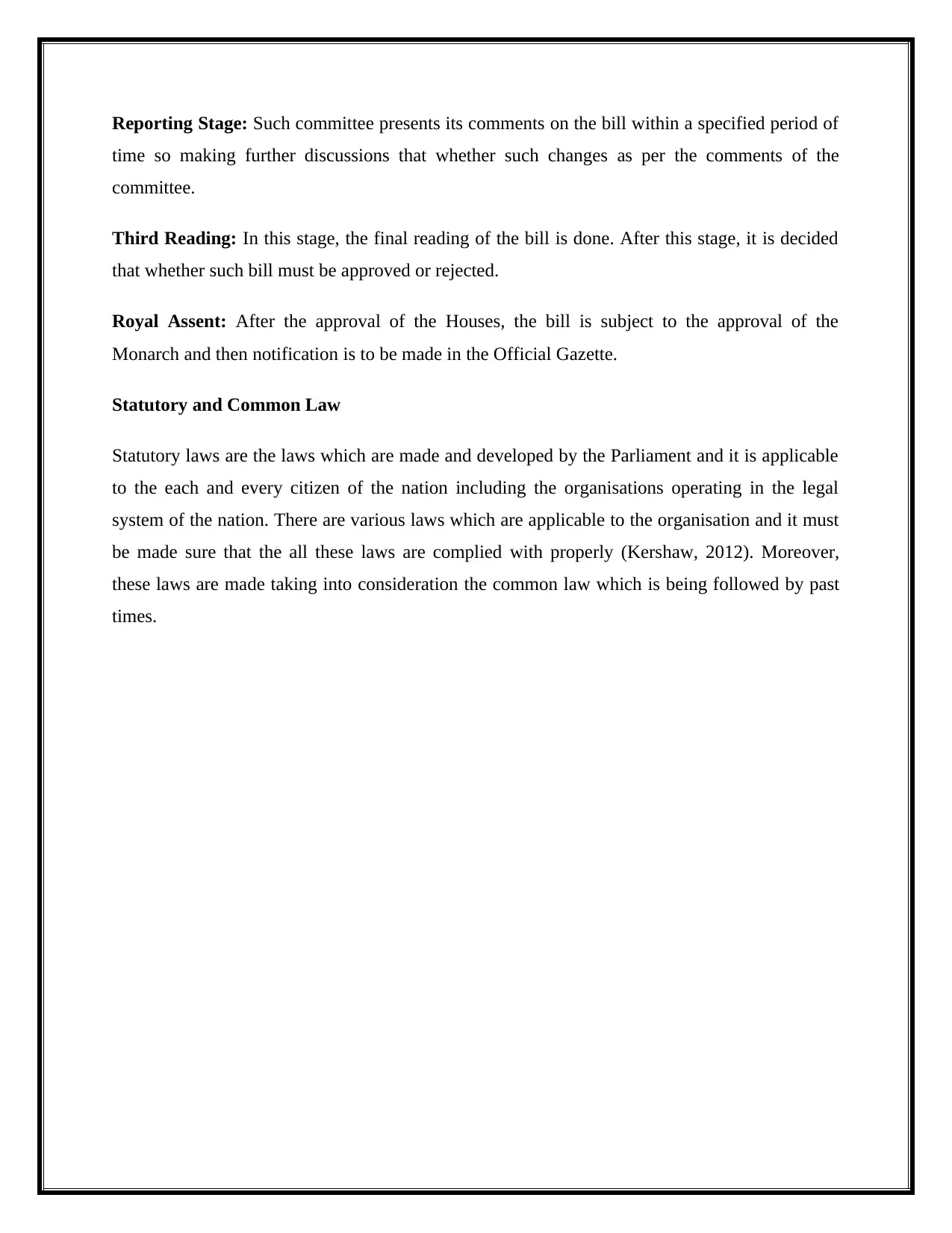
Reporting Stage: Such committee presents its comments on the bill within a specified period of
time so making further discussions that whether such changes as per the comments of the
committee.
Third Reading: In this stage, the final reading of the bill is done. After this stage, it is decided
that whether such bill must be approved or rejected.
Royal Assent: After the approval of the Houses, the bill is subject to the approval of the
Monarch and then notification is to be made in the Official Gazette.
Statutory and Common Law
Statutory laws are the laws which are made and developed by the Parliament and it is applicable
to the each and every citizen of the nation including the organisations operating in the legal
system of the nation. There are various laws which are applicable to the organisation and it must
be made sure that the all these laws are complied with properly (Kershaw, 2012). Moreover,
these laws are made taking into consideration the common law which is being followed by past
times.
time so making further discussions that whether such changes as per the comments of the
committee.
Third Reading: In this stage, the final reading of the bill is done. After this stage, it is decided
that whether such bill must be approved or rejected.
Royal Assent: After the approval of the Houses, the bill is subject to the approval of the
Monarch and then notification is to be made in the Official Gazette.
Statutory and Common Law
Statutory laws are the laws which are made and developed by the Parliament and it is applicable
to the each and every citizen of the nation including the organisations operating in the legal
system of the nation. There are various laws which are applicable to the organisation and it must
be made sure that the all these laws are complied with properly (Kershaw, 2012). Moreover,
these laws are made taking into consideration the common law which is being followed by past
times.
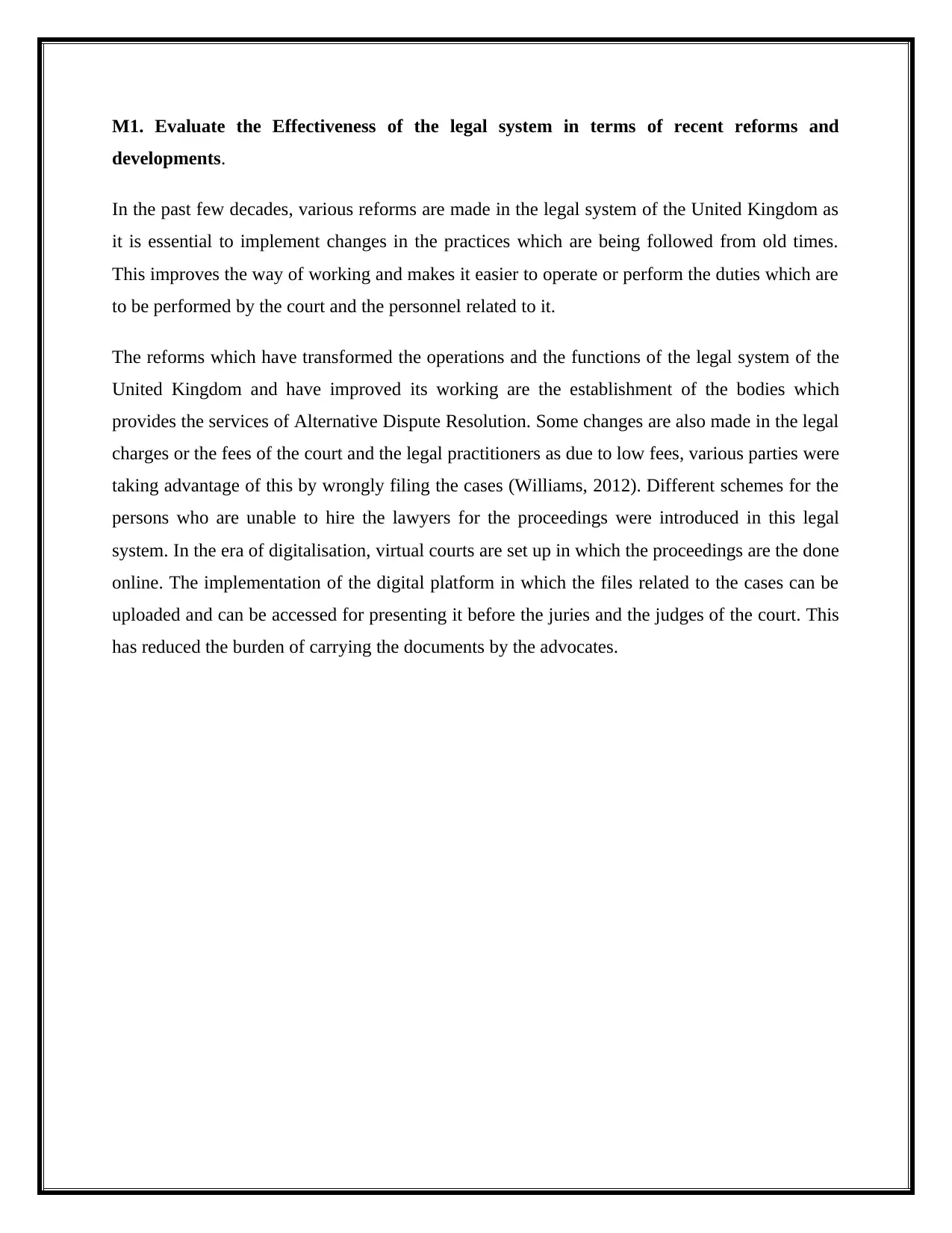
M1. Evaluate the Effectiveness of the legal system in terms of recent reforms and
developments.
In the past few decades, various reforms are made in the legal system of the United Kingdom as
it is essential to implement changes in the practices which are being followed from old times.
This improves the way of working and makes it easier to operate or perform the duties which are
to be performed by the court and the personnel related to it.
The reforms which have transformed the operations and the functions of the legal system of the
United Kingdom and have improved its working are the establishment of the bodies which
provides the services of Alternative Dispute Resolution. Some changes are also made in the legal
charges or the fees of the court and the legal practitioners as due to low fees, various parties were
taking advantage of this by wrongly filing the cases (Williams, 2012). Different schemes for the
persons who are unable to hire the lawyers for the proceedings were introduced in this legal
system. In the era of digitalisation, virtual courts are set up in which the proceedings are the done
online. The implementation of the digital platform in which the files related to the cases can be
uploaded and can be accessed for presenting it before the juries and the judges of the court. This
has reduced the burden of carrying the documents by the advocates.
developments.
In the past few decades, various reforms are made in the legal system of the United Kingdom as
it is essential to implement changes in the practices which are being followed from old times.
This improves the way of working and makes it easier to operate or perform the duties which are
to be performed by the court and the personnel related to it.
The reforms which have transformed the operations and the functions of the legal system of the
United Kingdom and have improved its working are the establishment of the bodies which
provides the services of Alternative Dispute Resolution. Some changes are also made in the legal
charges or the fees of the court and the legal practitioners as due to low fees, various parties were
taking advantage of this by wrongly filing the cases (Williams, 2012). Different schemes for the
persons who are unable to hire the lawyers for the proceedings were introduced in this legal
system. In the era of digitalisation, virtual courts are set up in which the proceedings are the done
online. The implementation of the digital platform in which the files related to the cases can be
uploaded and can be accessed for presenting it before the juries and the judges of the court. This
has reduced the burden of carrying the documents by the advocates.
⊘ This is a preview!⊘
Do you want full access?
Subscribe today to unlock all pages.

Trusted by 1+ million students worldwide
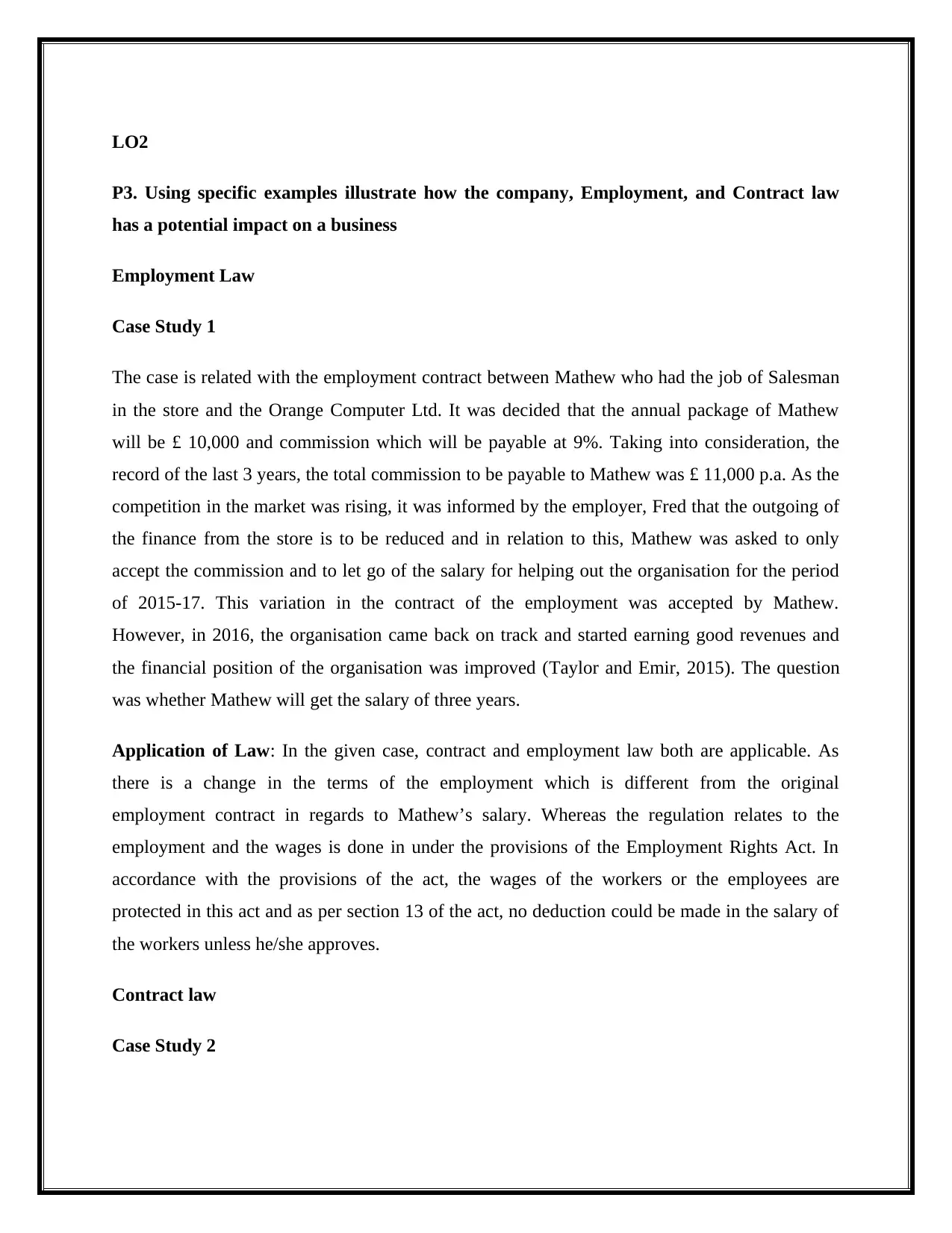
LO2
P3. Using specific examples illustrate how the company, Employment, and Contract law
has a potential impact on a business
Employment Law
Case Study 1
The case is related with the employment contract between Mathew who had the job of Salesman
in the store and the Orange Computer Ltd. It was decided that the annual package of Mathew
will be £ 10,000 and commission which will be payable at 9%. Taking into consideration, the
record of the last 3 years, the total commission to be payable to Mathew was £ 11,000 p.a. As the
competition in the market was rising, it was informed by the employer, Fred that the outgoing of
the finance from the store is to be reduced and in relation to this, Mathew was asked to only
accept the commission and to let go of the salary for helping out the organisation for the period
of 2015-17. This variation in the contract of the employment was accepted by Mathew.
However, in 2016, the organisation came back on track and started earning good revenues and
the financial position of the organisation was improved (Taylor and Emir, 2015). The question
was whether Mathew will get the salary of three years.
Application of Law: In the given case, contract and employment law both are applicable. As
there is a change in the terms of the employment which is different from the original
employment contract in regards to Mathew’s salary. Whereas the regulation relates to the
employment and the wages is done in under the provisions of the Employment Rights Act. In
accordance with the provisions of the act, the wages of the workers or the employees are
protected in this act and as per section 13 of the act, no deduction could be made in the salary of
the workers unless he/she approves.
Contract law
Case Study 2
P3. Using specific examples illustrate how the company, Employment, and Contract law
has a potential impact on a business
Employment Law
Case Study 1
The case is related with the employment contract between Mathew who had the job of Salesman
in the store and the Orange Computer Ltd. It was decided that the annual package of Mathew
will be £ 10,000 and commission which will be payable at 9%. Taking into consideration, the
record of the last 3 years, the total commission to be payable to Mathew was £ 11,000 p.a. As the
competition in the market was rising, it was informed by the employer, Fred that the outgoing of
the finance from the store is to be reduced and in relation to this, Mathew was asked to only
accept the commission and to let go of the salary for helping out the organisation for the period
of 2015-17. This variation in the contract of the employment was accepted by Mathew.
However, in 2016, the organisation came back on track and started earning good revenues and
the financial position of the organisation was improved (Taylor and Emir, 2015). The question
was whether Mathew will get the salary of three years.
Application of Law: In the given case, contract and employment law both are applicable. As
there is a change in the terms of the employment which is different from the original
employment contract in regards to Mathew’s salary. Whereas the regulation relates to the
employment and the wages is done in under the provisions of the Employment Rights Act. In
accordance with the provisions of the act, the wages of the workers or the employees are
protected in this act and as per section 13 of the act, no deduction could be made in the salary of
the workers unless he/she approves.
Contract law
Case Study 2
Paraphrase This Document
Need a fresh take? Get an instant paraphrase of this document with our AI Paraphraser
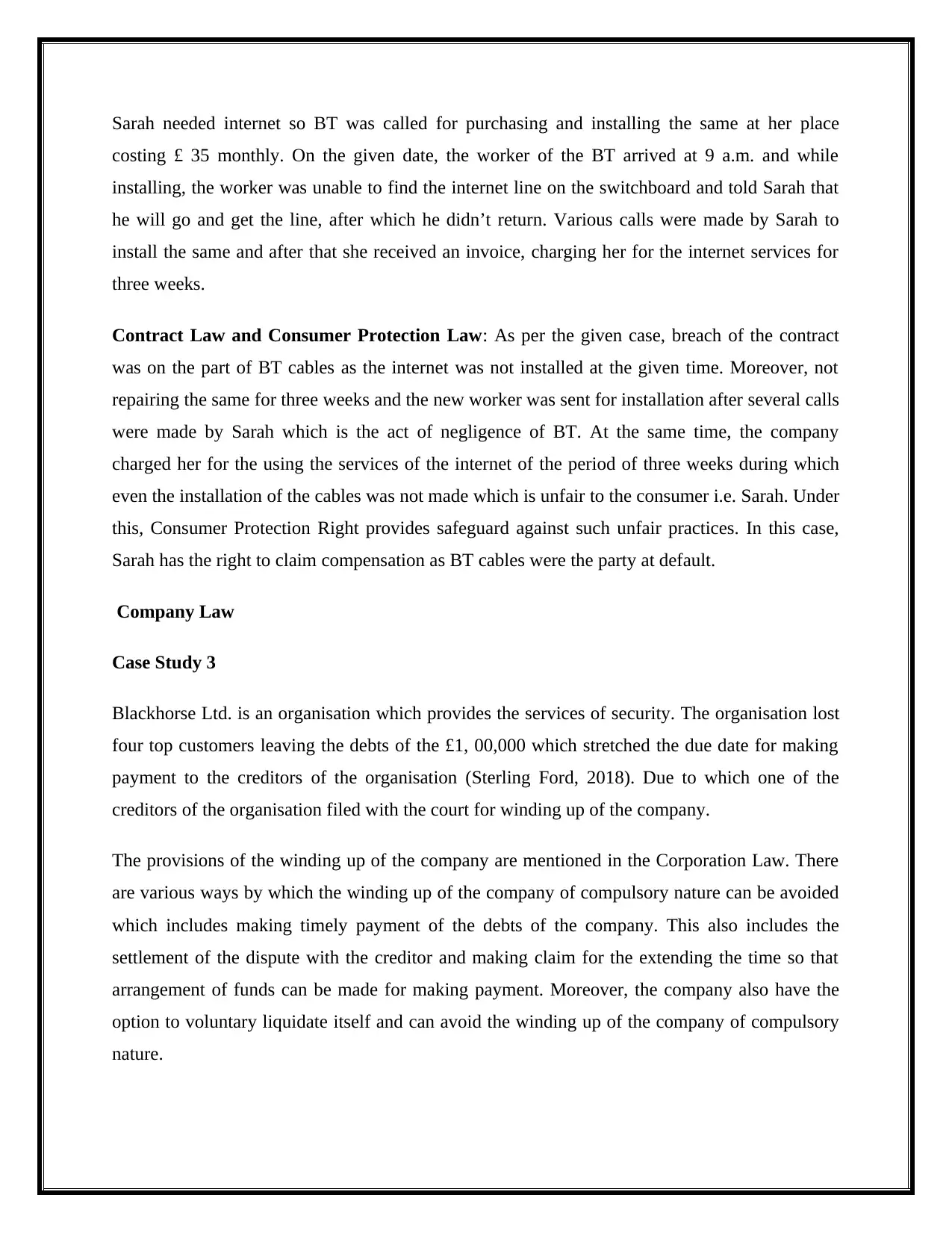
Sarah needed internet so BT was called for purchasing and installing the same at her place
costing £ 35 monthly. On the given date, the worker of the BT arrived at 9 a.m. and while
installing, the worker was unable to find the internet line on the switchboard and told Sarah that
he will go and get the line, after which he didn’t return. Various calls were made by Sarah to
install the same and after that she received an invoice, charging her for the internet services for
three weeks.
Contract Law and Consumer Protection Law: As per the given case, breach of the contract
was on the part of BT cables as the internet was not installed at the given time. Moreover, not
repairing the same for three weeks and the new worker was sent for installation after several calls
were made by Sarah which is the act of negligence of BT. At the same time, the company
charged her for the using the services of the internet of the period of three weeks during which
even the installation of the cables was not made which is unfair to the consumer i.e. Sarah. Under
this, Consumer Protection Right provides safeguard against such unfair practices. In this case,
Sarah has the right to claim compensation as BT cables were the party at default.
Company Law
Case Study 3
Blackhorse Ltd. is an organisation which provides the services of security. The organisation lost
four top customers leaving the debts of the £1, 00,000 which stretched the due date for making
payment to the creditors of the organisation (Sterling Ford, 2018). Due to which one of the
creditors of the organisation filed with the court for winding up of the company.
The provisions of the winding up of the company are mentioned in the Corporation Law. There
are various ways by which the winding up of the company of compulsory nature can be avoided
which includes making timely payment of the debts of the company. This also includes the
settlement of the dispute with the creditor and making claim for the extending the time so that
arrangement of funds can be made for making payment. Moreover, the company also have the
option to voluntary liquidate itself and can avoid the winding up of the company of compulsory
nature.
costing £ 35 monthly. On the given date, the worker of the BT arrived at 9 a.m. and while
installing, the worker was unable to find the internet line on the switchboard and told Sarah that
he will go and get the line, after which he didn’t return. Various calls were made by Sarah to
install the same and after that she received an invoice, charging her for the internet services for
three weeks.
Contract Law and Consumer Protection Law: As per the given case, breach of the contract
was on the part of BT cables as the internet was not installed at the given time. Moreover, not
repairing the same for three weeks and the new worker was sent for installation after several calls
were made by Sarah which is the act of negligence of BT. At the same time, the company
charged her for the using the services of the internet of the period of three weeks during which
even the installation of the cables was not made which is unfair to the consumer i.e. Sarah. Under
this, Consumer Protection Right provides safeguard against such unfair practices. In this case,
Sarah has the right to claim compensation as BT cables were the party at default.
Company Law
Case Study 3
Blackhorse Ltd. is an organisation which provides the services of security. The organisation lost
four top customers leaving the debts of the £1, 00,000 which stretched the due date for making
payment to the creditors of the organisation (Sterling Ford, 2018). Due to which one of the
creditors of the organisation filed with the court for winding up of the company.
The provisions of the winding up of the company are mentioned in the Corporation Law. There
are various ways by which the winding up of the company of compulsory nature can be avoided
which includes making timely payment of the debts of the company. This also includes the
settlement of the dispute with the creditor and making claim for the extending the time so that
arrangement of funds can be made for making payment. Moreover, the company also have the
option to voluntary liquidate itself and can avoid the winding up of the company of compulsory
nature.
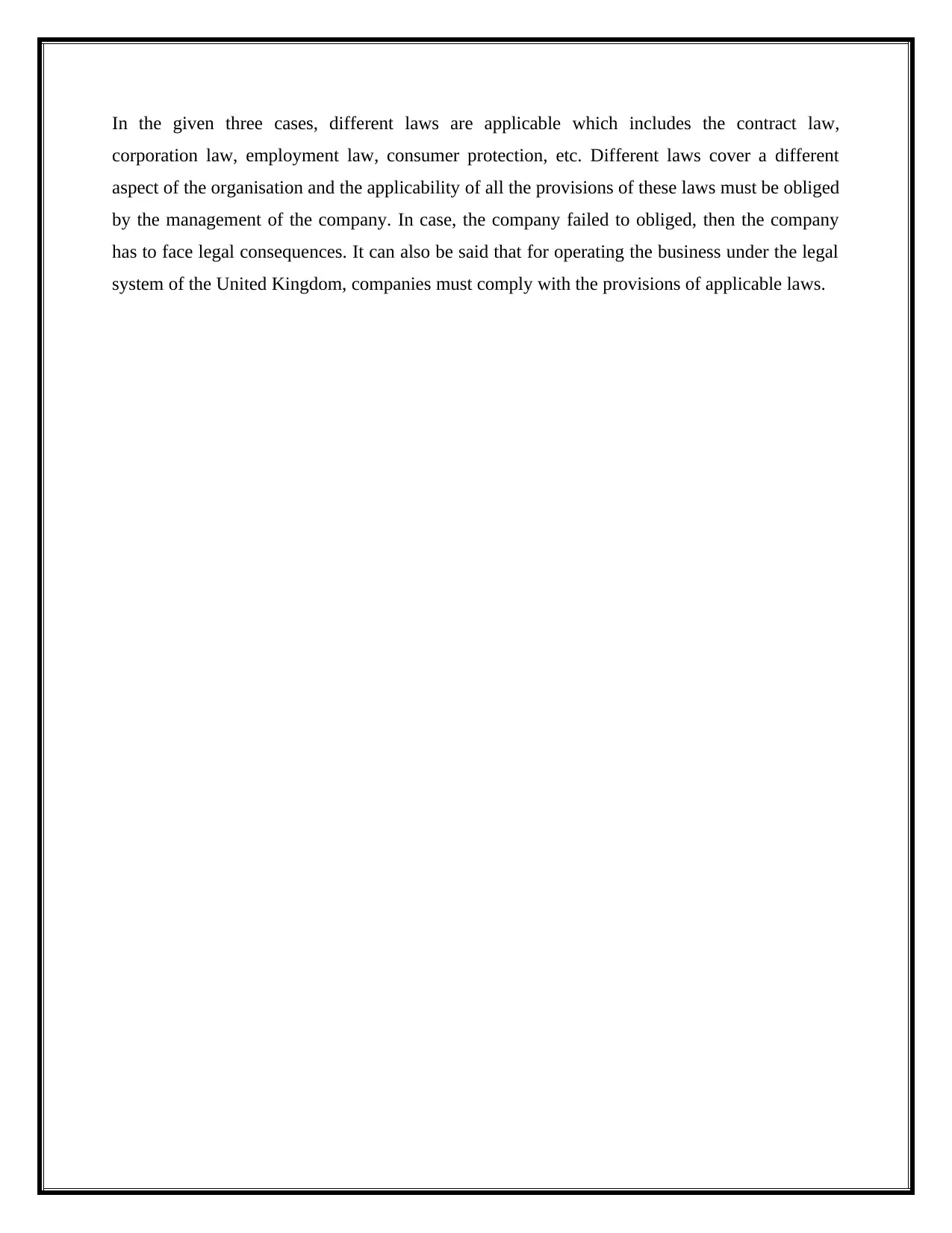
In the given three cases, different laws are applicable which includes the contract law,
corporation law, employment law, consumer protection, etc. Different laws cover a different
aspect of the organisation and the applicability of all the provisions of these laws must be obliged
by the management of the company. In case, the company failed to obliged, then the company
has to face legal consequences. It can also be said that for operating the business under the legal
system of the United Kingdom, companies must comply with the provisions of applicable laws.
corporation law, employment law, consumer protection, etc. Different laws cover a different
aspect of the organisation and the applicability of all the provisions of these laws must be obliged
by the management of the company. In case, the company failed to obliged, then the company
has to face legal consequences. It can also be said that for operating the business under the legal
system of the United Kingdom, companies must comply with the provisions of applicable laws.
⊘ This is a preview!⊘
Do you want full access?
Subscribe today to unlock all pages.

Trusted by 1+ million students worldwide
1 out of 23
Related Documents
Your All-in-One AI-Powered Toolkit for Academic Success.
+13062052269
info@desklib.com
Available 24*7 on WhatsApp / Email
![[object Object]](/_next/static/media/star-bottom.7253800d.svg)
Unlock your academic potential
Copyright © 2020–2025 A2Z Services. All Rights Reserved. Developed and managed by ZUCOL.





